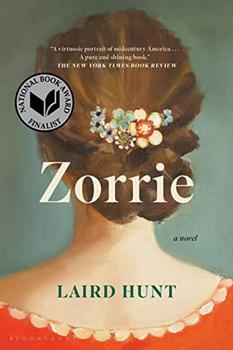Summary | Excerpt | Reading Guide | Reviews | Beyond the Book | Readalikes | Genres & Themes | Author Bio

Excerpt
Zorrie
Zorrie Underwood had been known throughout the county as a hard worker for more than fifty years, so it troubled her when finally the hoe started slipping from her hands, the paring knife from her fingers, the breath in shallow bursts from her lungs, and, smack dab in the middle of the day, she had to lie down. At first she carried out this previously unthinkable obligation on the worn leather of the daybed in the front room, with her jaw set, hands pressed tight against her sides, staring up at the end of a long crack that ran the length of the ceiling, or at the flecks of blue light thrown onto the legs of the dining room table by the stained-glass jay that hung in the south window. When after several minutes of this she felt her breath slowing and the blood flowing back out through her veins, she would ease herself up, shake her head, and resume whatever activity had been interrupted. Once, though, after she had slipped in the garden and landed in a tangle of rhubarb, she lay down on the daybed and fell into a deep, dreamless sleep that wasn't interrupted until, late in the evening, the cat began mewling and scratching at the side door. It took her a long time to come fully into consciousness, and as she lay there, vaguely urging her eyelids to open, aware that she was not quite awake, it seemed to her she had never felt so comfortable, so careless, so at ease. She set a feather pillow on the daybed and pulled a light wool blanket out of the upstairs closet. She began to intersperse her work in the garden and yard with regularly scheduled naps. She would lie on her side with her back to the room and look at the deep white of the wall. She would be unaware that her eyes had closed. She would sleep. Every now and again her conscience would chase her up off the daybed and back into her weedy rows or fruit-filled trees, but mostly during the time she had allotted, and sometimes past it, she just gazed at the wall or slept. One morning, well before it was time to lie down, she looked over at the pillow and blanket and soft leather and realized, with a shudder that seemed to chill and warm her both, that she was filled with longing.
She had never liked to dream. After diphtheria took first her mother and then her father, she was raised by an elderly aunt who told her that people were born dreaming of devils and dark roses and should beware. This aunt, whom her dying father had only called on reluctantly, for she had drunk too deeply from the cup of bitterness after a badly failed marriage, shook and scolded Zorrie vigorously when, as happened frequently during the first months, she woke up crying. If she woke up screaming, she received a slap. Sometimes she received a slap anyway. Either because of what she was leaving behind in the dizzying hallways of her head or what she was waking to, Zorrie came to harbor what proved a lifelong distrust of the deep hours, as her aunt referred to them, when the mind played tricks on itself.
Days were different. Zorrie ran, she skipped, she won a prize at school for turning the best cartwheel. She and the other children played with hoops and balls in the yard. No one could climb a tree as quickly as she could, and there were only two boys in the school who could beat her at arm wrestling. The teacher, Mr. Thomas, would take them on long walks through the woods and across the fields. Often on these expeditions they were asked to collect interesting objects. Zorrie would run back and forth like a dog working a field, her quick hands flashing down to the ground and up again. Heart pounding, she would bring her discoveries to Mr. Thomas for inspection. He would lift each leaf or mushroom or insect close to his face or up to the light or under his magnifying glass and, with Zorrie leaning over his shoulder, or even
holding the magnifying glass herself, murmur, "Yes. Very interesting. This is a good specimen, Zorrie. Well done."
Excerpted from Zorrie by Tristram Hunt. Copyright © 2021 by Tristram Hunt. Excerpted by permission of Bloomsbury USA. All rights reserved. No part of this excerpt may be reproduced or reprinted without permission in writing from the publisher.
Your guide toexceptional books
BookBrowse seeks out and recommends the best in contemporary fiction and nonfiction—books that not only engage and entertain but also deepen our understanding of ourselves and the world around us.